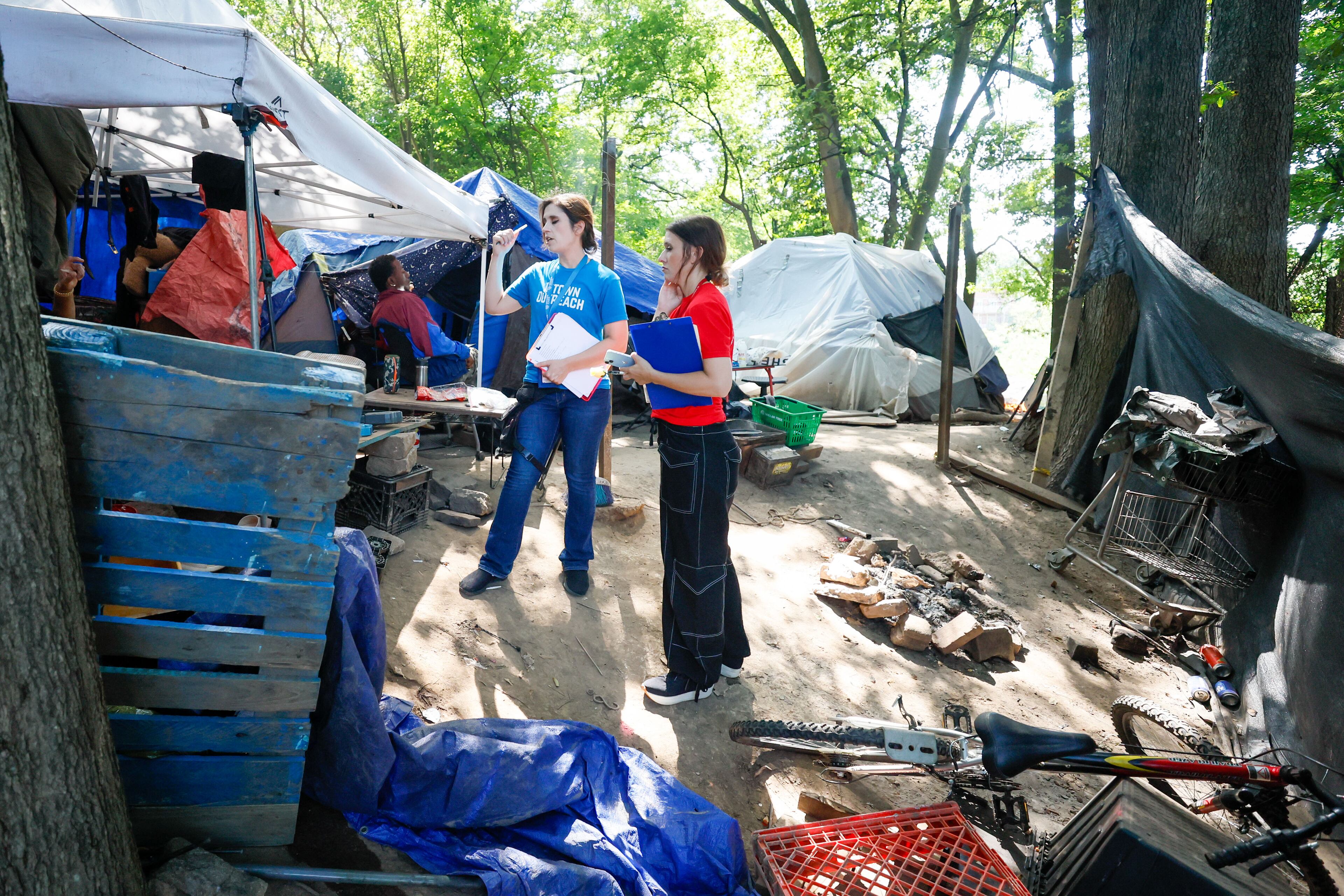Family homelessness up 14% in Atlanta in annual survey, even as chronic cases decline

Financial pressures on vulnerable households fueled a nearly 14% increase in the number of families experiencing homelessness in the city of Atlanta this year, according to estimates in a new report.
However, the overall number of people experiencing homelessness in the city increased by only 1% in 2025, suggesting the homeless population could be reaching a plateau, the report says.
Partners for Home, the nonprofit that works with the city on its strategy to reduce homelessness, produced the report which is based on the annual “point-in-time” homeless count conducted in January and early February.
In another hopeful note, the group adds that an expansion in permanent housing options, along with a focus on placing the most vulnerable people in permanent supportive housing, led to a 9% decrease in the number of people experiencing chronic homelessness in 2025.
Additionally, the report says the number of homeless veterans and homeless young people ages 18 to 24 decreased by 3% and 6%, respectively.
The point-in-time numbers are based on a citywide count of people who were sleeping outside, in an emergency shelter or transitional housing on a single day.
Thirty-two teams of volunteers canvassed 243 neighborhoods across the city on the night of Jan. 27 to conduct surveys to determine the number of unsheltered people. Then, over the following seven days, volunteers conducted more than 500 follow-up surveys at 26 sites to reach people who might have been missed on the night of the count.
Cathryn Vassell, chief executive officer of Partners for Home, noted that this year’s 1% rise in overall homelessness was a slimmer annual increase than had been recorded since 2022.
“Our hope is we can maximize some of this stability, and I think some of that is driven by the economics,” Vassell said. “Rents have stabilized over the last year somewhat, and so I think we are experiencing that stabilization in homelessness as well.
“So we’ve got to double down on continuing to get folks out of our system as quickly as possible. We’ve got to invest more in rehousing so that as we now stabilize, we can begin to see our total number of people experiencing homelessness go down.”
Tracy Woodard, an outreach worker for the homeless advocacy group Intown Cares, led a team of people who conducted surveys for this year’s point-in-time count. She said the 9% drop in chronically homeless people highlighted in the report is consistent with the numbers of people she has seen when visiting homeless encampments in recent months.
“Instead of like 30 people, there’s maybe one or two people,” Woodard said. “And when I go to those one or two people who are still there and say, ‘Where did everybody else go?’ they say: ‘Oh, they’re in apartments.’”

The number of families experiencing homelessness increased in the city from 115 last year to 131 this year, according to the point-in-time counts. Each family includes at least one adult and one child. This year’s 131 families are made up of 400 people, according to the report.
Vassell noted that of the 131 families, only 2% of them were unsheltered. The vast majority (91%) were in emergency shelters and the rest were in transitional housing, she said.
“We continue to see almost no unsheltered families in our system,” she said. “We continue to have a significant number of families in Atlanta that are living in poverty and living on the margins.
“I think we’ve got to do a better job of resourcing more housing interventions specifically for families, so we can get them out of homelessness as quickly as possible.”
Woodard said she hears from a lot of families that are having trouble making ends meet.
“I think the rent has gone up in a lot of places,” she said. “We get calls all the time asking, ‘Can you help with the utilities? Can you help with rent assistance? I’m behind on my bills.’”
Woodard added that the point-in-time count does not include the innumerable families who pay to live in motels. She said she knows of one church, for instance, that feeds all of the families in three extended-stay motels on Memorial Drive — which includes about 120 children.
Some families are afraid their children could be placed in foster care because they are homeless.
Over a period of less than two years ending last June, children were placed in foster care in Georgia more than 1,800 times at least in part because of homelessness, The Atlanta Journal-Constitution found.
Advocates for homeless populations in Georgia and across the U.S. fear the problem might get even worse, given President Donald Trump’s proposal for massive cuts to programs that play a role in local efforts to prevent homelessness.
“We have an affordable housing crisis in Atlanta, Georgia and across the country,” said Jesse Rabinowitz, spokesperson for the National Homelessness Law Center. “We know nationally that half of renters struggle to pay rent, and 1 in 4 people worry about imminently becoming homeless.”
For those who already have lost their homes, Rabinowitz said some cities across the U.S. have made things worse by criminalizing homelessness and closing encampments.
“We know that evicting homeless encampments is traumatic, it’s expensive and it makes homelessness worse, and we have seen in Atlanta, we have seen in California, that they kill people,” added Rabinowitz, referring to the January death of Cornelius Taylor in Atlanta.
Taylor was crushed by a Department of Public Works construction vehicle while he was inside his tent at the Old Wheat Street encampment across from Ebenezer Baptist Church.
Rabinowitz said he was glad to hear the numbers of chronically homeless people and homeless veterans appear to be trending downward in Atlanta.
“It shows that when we have resources like housing and supportive services, those resources are effective in getting folks off the streets and into housing that meets their needs,” he said. “Which shows that we actually do know how to solve homelessness.”



